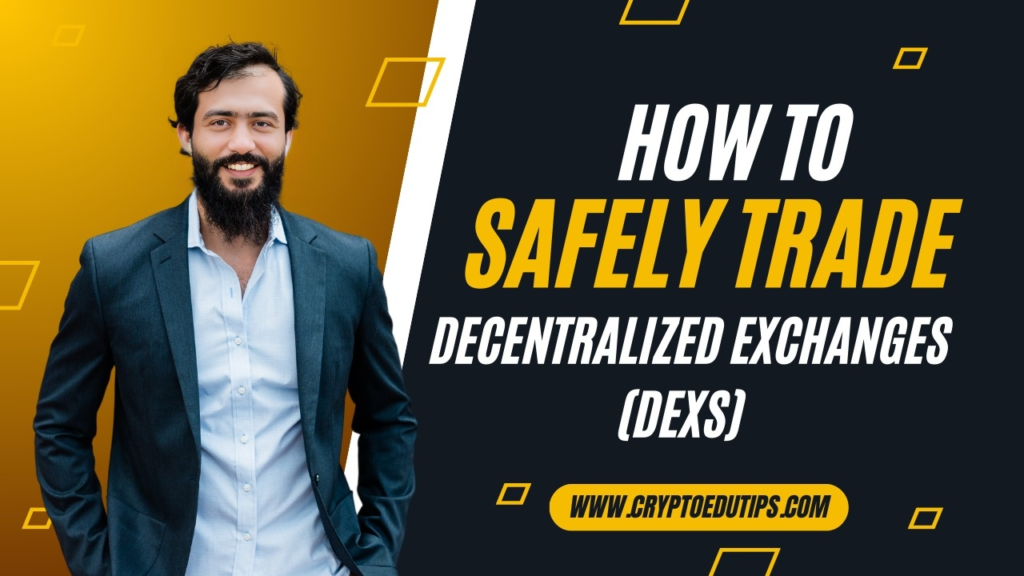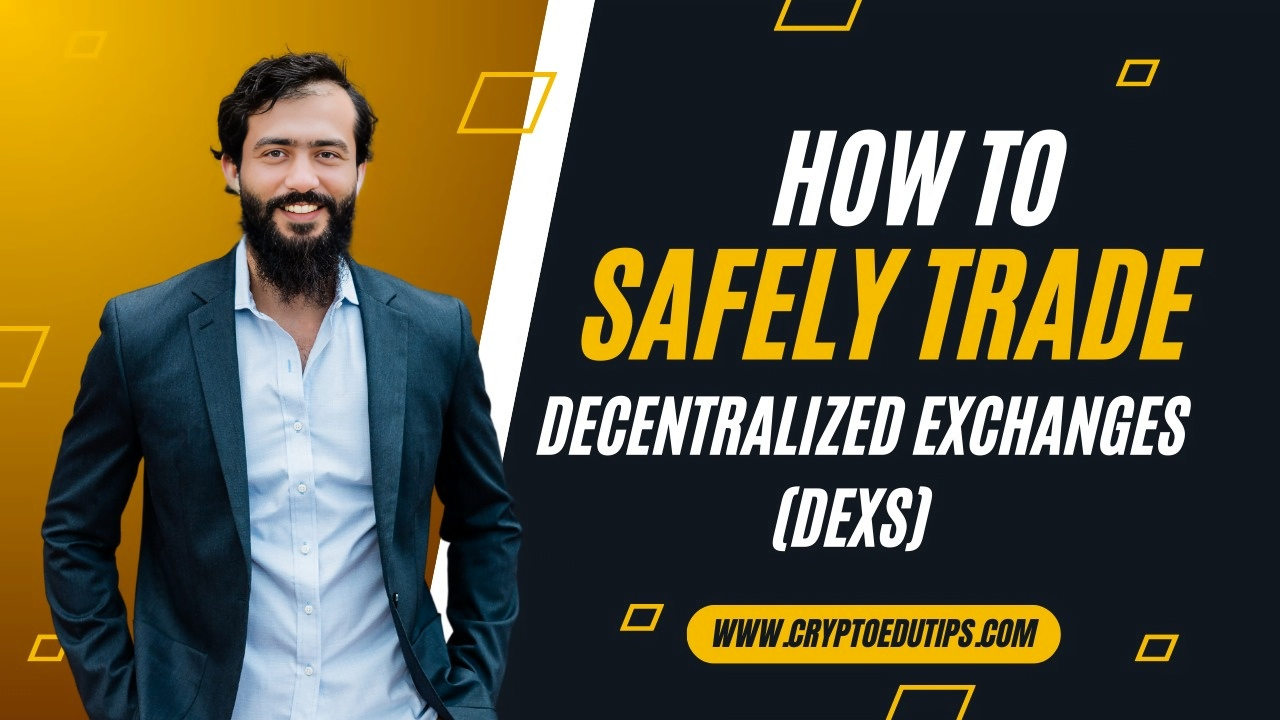
As the cryptocurrency market continues to evolve, Decentralized Exchanges (DEXs) have emerged as a popular alternative to traditional centralized exchanges. DEXs offer various advantages, including increased privacy, greater control over your assets, and reduced reliance on third parties. However, trading on DEXs also presents unique challenges and risks. This comprehensive guide will explore the pros and cons of trading on DEXs, provide strategies to mitigate risks, and offer practical tips for safely navigating the world of decentralized finance (DeFi).
Introduction to Decentralized Exchanges (DEXs)
Decentralized exchanges are platforms that allow users to trade cryptocurrencies directly with one another without the need for a central authority. Unlike centralized exchanges (CEXs), which rely on centralized entities to facilitate trades, DEXs operate on blockchain technology and smart contracts. This decentralized approach aims to enhance transparency, reduce counterparty risk, and give users greater control over their assets.
Examples of Popular DEXs:
- Uniswap: An Ethereum-based Decentralized Exchanges known for its automated market-making (AMM) protocol.
- PancakeSwap: A Binance Smart Chain (BSC) DEX offering lower transaction fees compared to Ethereum-based platforms.
- SushiSwap: A community-driven DEX with additional features and governance mechanisms.
- Curve Finance: Specializes in stablecoin trading with low slippage and fees.
- 1inch: A DEX aggregator that finds the best prices across multiple exchanges.
Pros and Cons of Trading on DEXs
Pros of Decentralized Exchanges:
1. Enhanced Privacy and Security:
- DEXs operate on blockchain networks that provide enhanced privacy and security features. Users retain control over their private keys, reducing the risk of hacking associated with centralized exchanges.
2. Greater Control Over Assets:
- Unlike CEXs, where assets are held in exchange-controlled wallets, DEXs allow users to retain ownership of their assets. This reduces the risk of asset loss in case of exchange insolvency or regulatory issues.
3. Lower Fees:
- Many DEXs have lower transaction fees compared to centralized exchanges. This is particularly true for platforms like PancakeSwap, which operate on blockchain networks with lower fees than Ethereum.
4. Access to New and Innovative Tokens:
- DEXs often list new and emerging tokens that may not be available on centralized platforms. This provides traders with opportunities to invest in innovative projects at an early stage.
5. Reduced Counterparty Risk:
- By eliminating the need for a central authority, DEXs reduce the risk of counterparty default. Transactions are executed through smart contracts, which are immutable and transparent.
Cons of Decentralized Exchanges:
1. Limited Customer Support:
- DEXs typically do not offer the same level of customer support as centralized exchanges. Users may have to rely on community forums or documentation for assistance.
2. Lower Liquidity:
- While DEXs offer various trading pairs, some may have lower liquidity compared to major centralized exchanges. This can result in higher slippage and less favorable trading conditions.
3. Complexity and Learning Curve:
- Trading on DEXs can be more complex than using centralized platforms. Users need to understand concepts like gas fees, slippage, and smart contracts, which can be challenging for beginners.
4. Smart Contract Risks:
- DEXs rely on smart contracts to execute trades. Bugs or vulnerabilities in these contracts can expose users to security risks, including potential loss of funds.
5. Regulatory and Compliance Issues:
- The decentralized nature of DEXs may attract regulatory scrutiny. Users should be aware of the legal and regulatory implications of trading on DEXs in their jurisdiction.
Understanding Key Concepts: Slippage, Liquidity, and Security
1. Slippage:
- Slippage refers to the difference between the expected price of a trade and the actual price at which the trade is executed. On DEXs, slippage can occur due to low liquidity or high volatility in the market.
2. Liquidity:
- Liquidity is the ease with which an asset can be bought or sold without affecting its price. High liquidity ensures that trades can be executed quickly and at favorable prices. DEXs with low liquidity may experience higher slippage and less favorable trading conditions.
3. Security:
- Security is a critical consideration when trading on DEXs. Users should ensure they are using reputable platforms with robust security measures, such as smart contract audits and multi-signature wallets. Additionally, safeguarding private keys and using hardware wallets can further enhance security.
How to Safely Trade on Decentralized Exchanges
1. Choose Reputable DEXs:
- Research and select reputable DEXs with a proven track record of security and reliability. Check for smart contract audits and user reviews before trading.
2. Use Hardware Wallets:
- For added security, store your private keys in hardware wallets rather than software wallets. Hardware wallets provide an extra layer of protection against hacking and malware.
3. Be Aware of Gas Fees:
- Gas fees can vary significantly on Ethereum-based DEXs. Monitor gas prices and consider trading during periods of lower congestion to reduce transaction costs.
4. Set Slippage Tolerance:
- Adjust your slippage tolerance settings based on market conditions. Higher slippage tolerance can help ensure that trades are executed, but may result in less favorable prices.
5. Verify Smart Contracts:
- Ensure that the smart contracts used by the DEXs are audited and free of vulnerabilities. Avoid using platforms with unaudited or unverified contracts.
6. Start Small:
- Begin with small trades to familiarize yourself with the DEX’s interface and trading mechanics. Gradually increase your trading volume as you gain confidence.
7. Stay Informed:
- Keep up-to-date with developments in the DeFi space, including new DEX features, security practices, and market trends. Follow reputable sources and engage with the community for insights.
8. Avoid Phishing Scams:
- Be cautious of phishing scams that target DEX users. Always verify the URL and ensure you are accessing the official DEX website before entering sensitive information.
Trading Strategies for Success
1. Arbitrage Trading:
- Arbitrage involves exploiting price differences between different exchanges. Monitor multiple DEXs and centralized exchanges to identify and capitalize on price discrepancies.
2. Liquidity Provision:
- Provide liquidity to DEXs by participating in liquidity pools. This can earn you rewards in the form of trading fees and platform tokens. Be mindful of impermanent loss and choose pools with stable assets.
3. Limit Orders:
- Use limit orders to control the price at which you buy or sell assets. Limit orders can help mitigate slippage and ensure that trades are executed at your desired price.
4. Diversification:
- Diversify your trading portfolio to manage risk. Invest in a variety of assets and trading pairs to reduce exposure to market fluctuations.
5. Regular Monitoring:
- Regularly monitor your trades, liquidity positions, and market conditions. Use analytical tools and charts to track performance and make informed decisions.
Conclusion
Trading cryptocurrency on decentralized exchanges (DEXs) offers numerous advantages, including enhanced privacy, greater control over assets, and lower fees. However, it also comes with its own set of challenges, such as lower liquidity, smart contract risks, and a steeper learning curve. By understanding key concepts like slippage, liquidity, and security, and implementing effective trading strategies, you can navigate the world of DEXs more safely and successfully.
As the DeFi ecosystem continues to evolve, staying informed and adopting best practices will help you make the most of your trading experience on decentralized platforms. Whether you are an experienced trader or a newcomer to the world of DEXs, this guide provides valuable insights to help you trade cryptocurrency safely and effectively.









